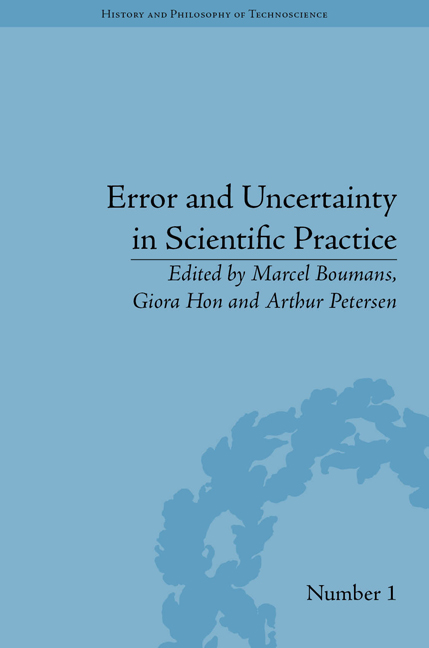11 results
12 - Disciplines
- from Part III - Knowledges
-
-
- Book:
- A Critical Assessment of the Intergovernmental Panel on Climate Change
- Published online:
- 08 December 2022
- Print publication:
- 22 December 2022, pp 107-115
-
- Chapter
-
- You have access
- Open access
- HTML
- Export citation
Frontmatter
-
- Book:
- Error and Uncertainty in Scientific Practice
- Published by:
- Pickering & Chatto
- Published online:
- 05 December 2014, pp i-iv
-
- Chapter
- Export citation
Contents
-
- Book:
- Error and Uncertainty in Scientific Practice
- Published by:
- Pickering & Chatto
- Published online:
- 05 December 2014, pp v-vi
-
- Chapter
- Export citation
List of Figures and Tables
-
- Book:
- Error and Uncertainty in Scientific Practice
- Published by:
- Pickering & Chatto
- Published online:
- 05 December 2014, pp xiii-xiv
-
- Chapter
- Export citation
List of Contributors
-
- Book:
- Error and Uncertainty in Scientific Practice
- Published by:
- Pickering & Chatto
- Published online:
- 05 December 2014, pp ix-xii
-
- Chapter
- Export citation
6 - Variations on Reliability: Connecting Climate Predictions to Climate Policy
-
-
- Book:
- Error and Uncertainty in Scientific Practice
- Published by:
- Pickering & Chatto
- Published online:
- 05 December 2014, pp 137-156
-
- Chapter
- Export citation
Acknowledgements
-
- Book:
- Error and Uncertainty in Scientific Practice
- Published by:
- Pickering & Chatto
- Published online:
- 05 December 2014, pp vii-viii
-
- Chapter
- Export citation
Notes
-
- Book:
- Error and Uncertainty in Scientific Practice
- Published by:
- Pickering & Chatto
- Published online:
- 05 December 2014, pp 209-242
-
- Chapter
- Export citation

Error and Uncertainty in Scientific Practice
-
- Published by:
- Pickering & Chatto
- Published online:
- 05 December 2014
-
- Book
- Export citation
Index
-
- Book:
- Error and Uncertainty in Scientific Practice
- Published by:
- Pickering & Chatto
- Published online:
- 05 December 2014, pp 243-249
-
- Chapter
- Export citation
14 - Reflective approaches to uncertainty assessment and communication
-
-
- Book:
- The Politics of Scientific Advice
- Published online:
- 25 October 2011
- Print publication:
- 02 June 2011, pp 259-269
-
- Chapter
- Export citation



